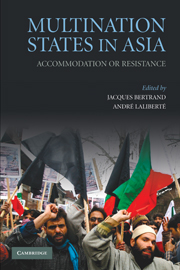Book contents
- Frontmatter
- Contents
- List of Tables and Figures
- List of Maps
- List of Contributors
- Acknowledgments
- Maps
- 1 Introduction
- 2 Revolutionary State Formation and the Unitary Republic of Indonesia
- 3 The Crisis of Border States in India
- 4 Pakistan: Neither State Nor Nation
- 5 Constitutional Politics and Crisis in Sri Lanka
- 6 The Dilemmas of Burma's Multinational Society
- 7 The Double-Edged Sword of Autonomy in Indonesia and the Philippines
- 8 China and the Virtual Taiwan Nation
- 9 The Failure of Ideologies in China's Relations with Tibetans
- 10 Leninism's Long Shadow in Central Asia
- 11 Conclusion
- References
- Index
10 - Leninism's Long Shadow in Central Asia
Published online by Cambridge University Press: 05 June 2012
- Frontmatter
- Contents
- List of Tables and Figures
- List of Maps
- List of Contributors
- Acknowledgments
- Maps
- 1 Introduction
- 2 Revolutionary State Formation and the Unitary Republic of Indonesia
- 3 The Crisis of Border States in India
- 4 Pakistan: Neither State Nor Nation
- 5 Constitutional Politics and Crisis in Sri Lanka
- 6 The Dilemmas of Burma's Multinational Society
- 7 The Double-Edged Sword of Autonomy in Indonesia and the Philippines
- 8 China and the Virtual Taiwan Nation
- 9 The Failure of Ideologies in China's Relations with Tibetans
- 10 Leninism's Long Shadow in Central Asia
- 11 Conclusion
- References
- Index
Summary
Those who study state policies toward sub-state national minorities typically focus on how responsive the state is to minorities that are already politically mobilized. This book is no exception; it follows a venerable tradition of examining groups that seek self-determination to consider the extent to which and the forms by which such groups are accommodated.
An already mobilized minority and degrees of state responsiveness are an important theoretical possibility, but one among many. States do more than react; they also act, sometimes decisively and with clear initiative and agency. When they do, their actions may be viewed as preceding, rather than following, the political mobilization of cultural groups.
If it is difficult to discern the empirical outlines of such proactive policies in some Asian cases, ex-Soviet Central Asia (Kazakhstan, Kyrgyzstan, Turkmenistan, Tajikistan, and Uzbekistan) brings them and their impact into sharp relief. The Leninist state in the Soviet Union sought – as a part of its ideological and coercive agenda – to be proactive in attending to minority groups, even in those regions where levels of nationalist mobilization were low, popular national identities were practically nonexistent, and local identities prevailed. In this chapter, I argue that these policies set in motion political processes that were ultimately beyond the ability of the Soviet state to control. Central Asia's political development since the Soviet collapse has been deeply conditioned by this Leninist legacy.
This chapter begins by addressing the blind spots in a literature that assumes that groups are already mobilized.
- Type
- Chapter
- Information
- Multination States in AsiaAccommodation or Resistance, pp. 244 - 262Publisher: Cambridge University PressPrint publication year: 2010
- 1
- Cited by



